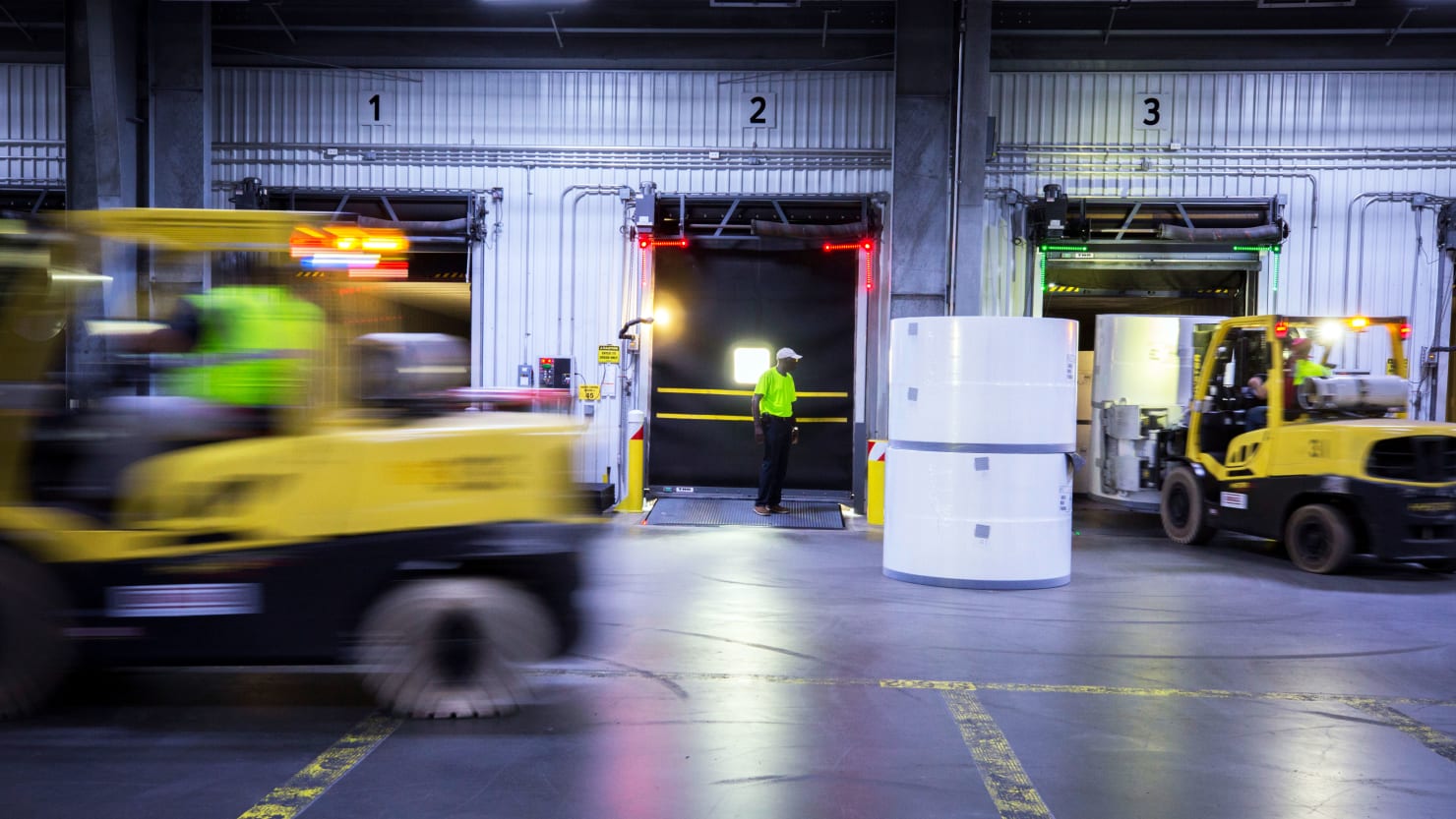Frank Bill is a self-taught, blue-collar author who grew up on a farm in Indiana, surrounded by hunting, fishing, war veterans, and working-class folks. His books have been hailed by readers and reviewers alike as a literary gut punch. His new novel, Back to the Dirt, follows a Vietnam War veteran who works in a factory while struggling with PTSD. Frank continues to work 12-hour shifts in a factory near his home in southern Indiana, where he creates polymers and urethanes—paint additives—while keeping notes for future stories in his Moleskin. In 2009, he started a five-year stint in the factory’s warehouse, where he unloaded raw materials for production and loaded the finished products into shipping containers and over the road trailers. The essay below is an account of one morning in the warehouse during that time.
8:15 a.m.
The SCP warehouse sits in the west end of Louisville, Kentucky. A working-class area where Blacks and whites survive among the worn brick and potholed streets. Wearing a scuffed blue hardhat, the SCP warehouse chief tells me, “Don’t know what kinda game he’s playin’ but I’m tired of it.”
I’ll call him Paul, not his real name. Like most of the guys I work with, Paul’s a white dude. He found God two years ago. He has an anger problem. His complexion is similar to raw bratwurst. He’s bulldog-jawed with stubble, fuming at the tanker of Polyethylene-Glycol (we call it Peg), or Carbowax. It’s a clear, molten liquid, the base ingredient for every polymer and urethane that’s made in the plant. There’s over 40,000 pounds of this raw material for the Associative Thickener Plant that’s been sitting across the street next to the north warehouse since 7:30 a.m. in the unloading pit. Paul believes it’s the other warehouse operator’s turn to unload it.
It’s my week to run the warehouse office, a 12×12 room constructed of a drop ceiling, cement block walls, big screen TV-sized glass windows, and tile floor. The office sits within a corner behind me in the football-field-sized south warehouse.
At 8 a.m., Monday thru Friday, whoever runs the office will check the backlog on their computer for add-on shipments. Phone truck lines for inner city pick-ups. Get paperwork printed out so the two operators running the warehouse floor can pull shipments for the next day.
It’s Paul’s week to work the floor. Meaning he’ll help the other operator haul finished material from the line-up across the street, load finished product or unload raw materials from tankers for the Associative Thickener Plant or from railcars for the clay plant.
“He unloaded one last week, when you were off.”
When Paul gets aggravated, it’s similar to talking to a wall, like right now, he acts as though he didn’t hear a word I said.
“I did the last one. I’ve had a bad week. I don’t need this today.”
“We had two Peg trucks last week. The second one came when you were off. I’ll unload this one.”
“It’s not your turn.” He snaps. Gets on my scratched and beat TOYOTA fork truck. We only have two in our area, Goose’s and mine. Paul revs down the dock ramp, across the rutted street and into the north warehouse. Passing the other operator. They don’t acknowledge each other.
The other operator, Goose, drives through the open bay on his fork truck. Across the cracked floor carrying a pallet of plastic wrapped material that’s about four feet tall and four feet wide. He’s bringing it from the line-up, material being produced by one of the two plants that run 24 hours a day. He’ll place it in one of the rows that line the right and left sides of the warehouse. There are close to 30 on each side.
Stopping, his back is to me, he swivels around on the idling fork truck. He wears a gray hard hat turned backwards, baseball-sized number 3 in its center, union and UK stickers on the sides. Shaded safety glasses hide his eyes. He has a neatly trimmed goatee. He’s a die-hard UK fan, bleeds blue. He asks me, “He not gonna unload that Peg truck?”
Standing outside the office, I step toward him and say, “He thinks it’s your turn.”
“Didn’t you tell him I unloaded the last one?”
“I did.”
“What’d he say?”
Before I can answer, the warehouse phone rings. Sounds off like a horn. Bouncing from the insulation-padded ceiling that hovers 30 feet or better over ahead, down to the solid nicked floor and tin walls that are lined with webs of gray dust.
Turning around, I walk to the open bay door where a grit-covered phone is mounted. Irritated, I answer. “Warehouse.”
“Hey,” It’s our warehouse manager. I’ll call him Art. “Tell Goose we got a Peg truck that needs to be unloaded.”
Not Rocket Science
Go back four or five years ago, when rumors floated around about getting bought out by our competitor. Fearing pay cuts and higher-costing insurance, union cards got passed around. We got bought. The union was voted in. The warehouse manager, and all other managers for that matter, are non-union. Art’s management. Sits in his office, in the north warehouse across the street.
All three of us know the truck is here. It was in the pit when we arrived this morning.
“He knows,” I say. “It’s not—”
Art has already hung up. I wanted to say “rocket science.” Art is the guy who always worries about his job. When his boss wants something done, regardless of how important the job we are doing is, he expects us to drop it. Do what he needs done. This is our daily deck of cards. Miscommunication. Butting heads. Fifteen-minute break. Start over till lunch time.
8:45 a.m.
Phoning the Associative Thickener plant manager, I ask which storage tank George wants the Peg pumped into. George gives me the tank number. It’s not empty. Tells me, it’ll take a bit.
I hang up the phone. We have a two-hour window to unload the Peg before we get charged extra. It’s called “the marriage.” The truck driver has never delivered to us before, needs to be told where to drop his trailer. Hook up his pump to unload the Peg. I grab my safety shield and leather gloves. Walk across the street. Rattle the driver’s maroon door with my palm. He’s a Black dude. More than likely from Mississippi or Louisiana as the company that delivers the Peg is located down South.
“Wanna step out,” I say, as I turn, point to the knee-high rock wall that protects the pit in-case of a spill, “you need to get as close to the wall as possible. You’ll need all the room you can get after you drop your tanker and pull up beside it.”
He tells me, “OK.”
The pit is wide enough for two semis to sit side-by-side with trailers attached. The driver appears starved, wiry built. Walking alongside his chrome tanker to its rear, our reflections expand like we’re in a funhouse of mirrors.
After I show him how far he needs to back up, he pulls the tanker forward and guides it in. The airbrakes sound. I chalk the rear tires. Check the temperature gauge on the other side of the tanker. 210 degrees. It’ll start to set up at 160, looking like frozen Cool Whip, it’ll plug and blow the lines apart. But we’re good. It’s boiling.
“The sun is working its way up over the city, turning up the heat. My clothes are starting to stick to me.”
At the pit’s rear, I check our feed line. Make sure the line isn’t blocked. Opening the nitrogen valve, I try to blow nitrogen through the feed line to the Associative Thickener Plant, which is a good 100 feet away. The pressure gauge doesn’t drop. There’s a plug.
To my left, Paul comes out of the north warehouse’s rusted side door.
I tell him about the plug.
He tells me, “I got it. I misunderstood what you said.”
9:10 a.m.
Resting my arms across a white countertop that separates Art from me I say, “Look, they’re good workers, but I’m tired of being in the middle when they get pissed off at one another.”
“I know. I just had knee surgery. Had to walk all over the place to find Paul. I—”
Art’s about 5 feet, 7 inches tall. Gray stubble on the sides of his tan head with much less in the center. He had curved legs, bad. Everyone joked about him being bowlegged. Before his surgery, guys would tell him he’d be 6 feet tall after the procedure was finished.
Waving a hand he says, “You don’t need to hear this. I’m having a meeting with them.”
9:30 a.m.
I’m talking to Art about a shipment when Paul bursts in behind me. “Peg driver’s hose just blew.”
It’s as if someone just cut the oxygen off in the office. There are no alarms for this. Just reaction.
Fretting, Art stands up and asks, “Where’s the spill kit?”
Eyeing Art like he’s 10 kinds of stupid, Paul says, “You got it back there in one of your cabinets.”
Art drags out a box. Carries it from his office to the north dock. Drops it on the flat surface.
These things happen maybe once a year. When they do you gotta be on your toes, remember the protocol. Get the spill contained. Cleaned up. Report it to the safety manager. Make sure nothing goes to the city sewer, especially if it’s hazardous. If that happens OSHA gets involved. But Peg isn’t a hazardous material.
Paul and I grab several long blue absorbent socks from the box. They’re called Pig Socks. Taking them out the side door, to the pit, we form a square barrier beneath the feed line but around the sump that’s covered by a stainless metal screen. Peg will harden quickly. If it gets into the sump, it’ll be similar to peanut brittle and yield the pump useless.
Looking at the truck driver’s hose, it’s laying ripped open with Peg rivering out of it. Creating a huge sticky puddle of donut glaze outside of the Pig Socks.
Walking back in the side door, Art’s wearing a Dallas Cowboy’s hardhat with ear muffs the color of Mountain Dew. He’s on his Blackberry reporting the spill to our safety guy. Sounding rushed, he asks me, “Anything get in the sump?”
“Maybe two gallons.”
Out in the pit, the driver says it’s not his fault. There must’ve been a blockage on our end.
Stepping in the side door of the north warehouse, we have a touch screen to choose the correct tank to pump the materials too. We monitor the tanks as they fill up. And Paul tells the driver, “You pumped 2,000 pounds into the tank before the line busted. You were running your pump too fast.”
Worried about whose fault it is, a report will have to be written, detailing what happened. Art tells me, “Get the camera, we need pictures. Email them to me.”
9:45 a.m.
After grabbing the digital camera from the south warehouse, I snap pictures of the spill from different angles. The sun is working its way up over the city, turning up the heat. My clothes are starting to stick to me.
We’re not even two hours into another eight-hour day. Trucks need to be called for outgoing shipments. Material needs to be brought over and inventoried. Shipments for tomorrow need to be pulled, the Peg truck still needs to be unloaded. Other than the spill, this is a normal workday in the SCP warehouse and I’m ready for my 15-minute break.
Frank Bill is the author of Back to the Dirt, Crimes in Southern Indiana, Donnybrook (now a major motion picture), The Savage, and, with Norman Reedus, The Ravaged. He’s also written for The New York Times, Granta, and the Oxford American; published short stories in Playboy and several anthologies; and penned four issues of the comic book series The Crow.



